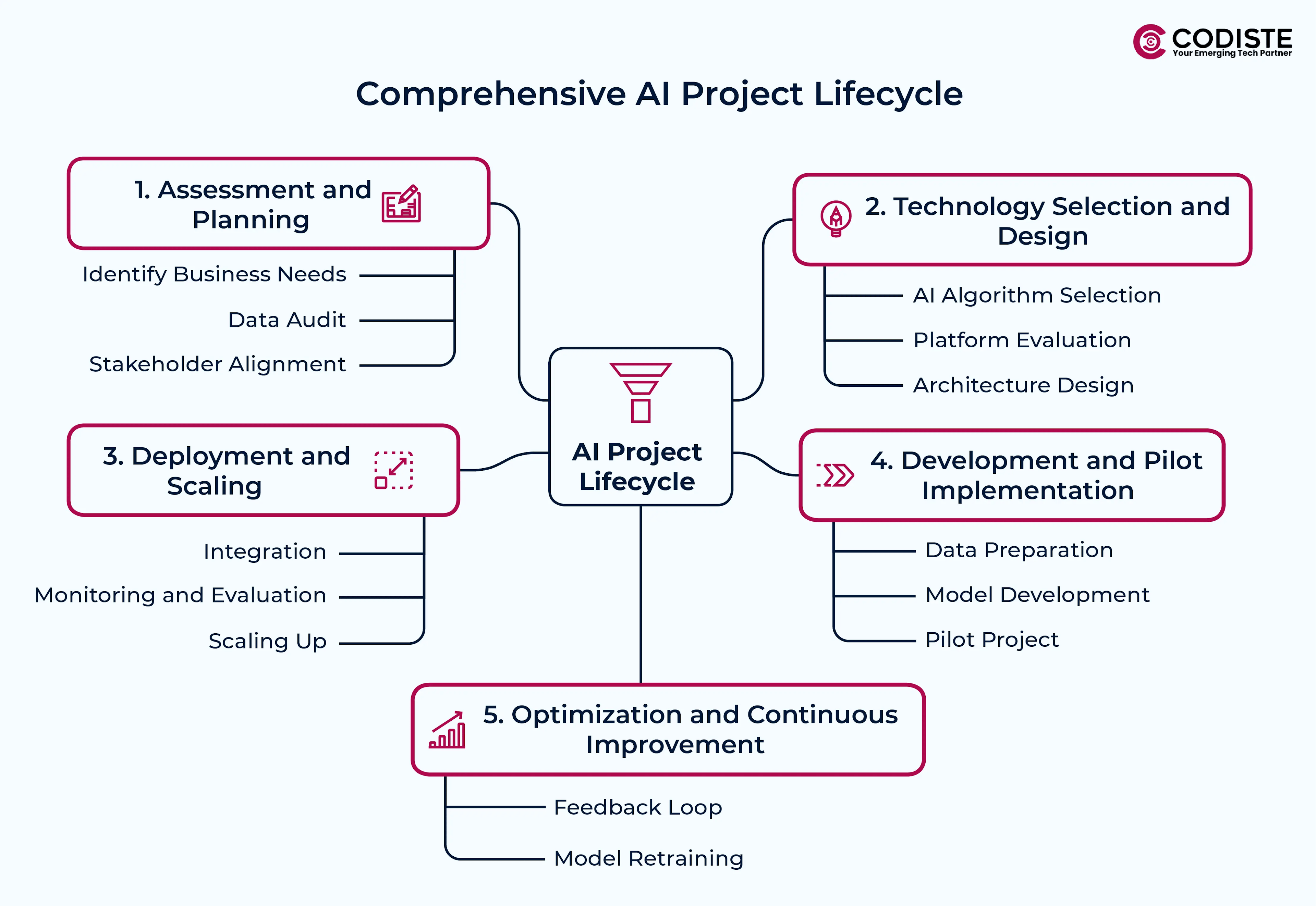
,
Businesses are facing stiff competition these days, so they need to make thoughtful and data-driven decisions to stay ahead. The one method to reach this goal is to use custom AI marketing tools. These tools are designed to enable companies to get a better understanding of their customers, to predict the trends, and to develop more personalized marketing strategies. AI introduced creative and well-targeted AI-powered marketing strategies that bring enormous efficiency, customer engagement, and increased income to any business.
AI marketing solutions are not generic solutions. They are focused and designed to follow their individual business goals. A well-thought-out roadmap can help ensure a successful adoption. This article will describe the core steps of custom AI marketing solutions deployment, including the difficulties involved, and the ways to eliminate them.
5 Key Stages of Deploying Custom AI Marketing Solutions
Assessment and Planning
- Identify Business Needs
First of all, the company has to understand the business needs and create the foundation for the process of deploying AI in marketing. The company should start by looking for the marketing challenges that they are likely to face. This could consist of customer targeting, campaign processes automation, or market trends prediction. Well-defined objectives set the stage for AI development, guaranteeing that the solution is in line with the long-term business goals. - Data Audit
An audit of data is a must-have at this point. Data stands at the center of any AI marketing tool. Hence, the requirement to analyze the quality and availability is a basic need. It is required to review the gaps, inconsistencies, and irrelevant information in the data stored in the database. Also, it is important to ensure the compliance of the given data with data privacy regulations. - Stakeholder Alignment
Stakeholder alignment is an essential factor in the successful outcome of the project. Marketing teams, IT departments, and senior management must be involved with the AI marketing solutions development project at early stages. The clarity in communication among the members about the goals, timelines, and expectations provides zero chance of misunderstandings and easy AI marketing implementation.
Technology Selection and Design
- AI Algorithm Selection: Choosing the correct technology is the most important thing for the successful artificial intelligence marketing solutions deployment. AI algorithms should be hand-picked by the companies as per their specific marketing objectives. To give an example, predictive analytics could be employed to predict customer behavior and on the other hand, natural language processing (NLP) could be used for chatbots and content creation that is personalized.
- Platform Evaluation
It is also important to evaluate different platforms that provide AI development facilities. Companies need to weigh scalability, ease of use, integration capabilities, and cost when deciding on a platform. - Architecture Design
Creating a system architecture is another significant thing. The structure should be designed in such a way that data can run smoothly through all channels. Also, it is very important to ensure that the system must be able to perform data management and storage efficiently. Organizations must determine if they should utilize cloud-based IT systems or keep the infrastructure on-premise.

Development and Pilot Implementation
- Data Preparation
The development stage requires the organization of data, creation of models, and testing of the solution. Data preparation is a key element here. It means that we must clean up the data by removing the irrelevant information and make sure that the data formats are all consistent. - Model Development
Correctly labeled and structured data sets are the foundation of training AI models. Continuous testing serves the purpose of improving the accuracy and also enhancing the efficiency of the models. - Pilot Project
Pilot projects are deemed a requisite step before the full extent of deployment. The pilot stage intends to find possible trouble spots and suggest ways to optimize the solution.
Deployment and Scaling
- Integration
When the pilot project proves to be successful, deploying the solution at scale should be considered as the next step. Integration is a major part of this phase. The AI solution should fit into the current marketing infrastructure by integration with the CRM system, email marketing platform, and analytics tool. - Monitoring and Evaluation
To make sure the AI solution fits the business requirements, it has to be regularly monitored and evaluated. The most important company performance metrics such as customer engagement rates, conversion rates, and campaign efficiency should be always checked. - Scaling Up
If the AI-driven marketing solution offers good results, the companies can then apply it to the different marketing channels and campaigns. It is a must to be sure that the infrastructure can deal with the increased data processing demands.
Let Our AI Experts Help Build Your Digital Transformation Roadmap
Optimization and Continuous Improvement
- Feedback Loop
The AI-powered marketing solution's effectiveness is directly related to the frequency of their update and improvement. Improvement in the software should be tracked by obtaining feedback from users and co-creating the solutions together with the stakeholders. To get a deep understanding of customer interaction, it is important to look at the related data. - Model Retraining
Model retraining is one of the necessities to keep AI solutions accurate and relevant. Also, AI models that are rehabilitated with new data become adaptive and effective when markets and customer behaviors change. Regular updates help companies to benefit from AI-powered marketing.
Overcoming Challenges in Custom AI Marketing Deployment
- Data Quality and Availability
One common problem in the AI marketing implementation specifically designed for marketing is ensuring data quality and availability. Data quality and availability are common issues. Poor data quality can cause the AI models to operate poorly. Data audits should become a common practice. Regular data audits and the implementation of strong data hygiene practices are necessary for businesses to overcome this challenge. - Technical Complexity and Integration
AI development Integration problems and technical difficulties can also bring new difficulties. AI marketing integration with the existing systems needs a careful approach and the collaboration of experts. Implementing tools and applications that support seamless and smooth integration is the way to do so. - Ethical and Social Considerations
Ethical and social considerations are of great significance when implementing AI-driven marketing solutions. Businesses have to be sure about the adherence to ethical guidelines and data privacy regulations. Being open about data usage and asking permission from customers before acting are two of the measures that help maintain trust. - Cost and ROI Concerns
The problem of cost and ROI is another obstacle. The cost of AI solutions can be a real hurdle, particularly for smaller enterprises. Pilot projects can enable companies to verify the return on investment (ROI) before they decide to upscale.
Conclusion
Utilizing customized AI marketing solutions is a complex process that calls for a lot of planning, design, and a relentless quest for the perfect solution. With the help of a well-structured plan, companies can adopt AI solutions to avail better marketing strategies, develop customer-centric experiences, and overall become more effective.
The success of the company in the long term depends on the ability to overcome obstacles related to the quality of data, technical complexity, and cost issues. By choosing the correct marketing stack integration strategy and combining it with a well-crafted AI-driven marketing plan, businesses can become successful in the highly-changing market. Want to optimize customer journey with marketing automation deployment? Discuss your AI deployment requirements with our experts and get a result-driven custom AI marketing deployment solution.




